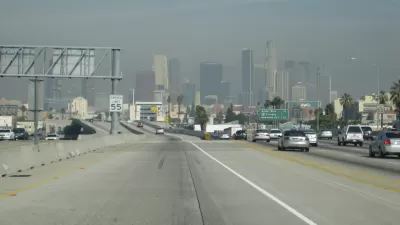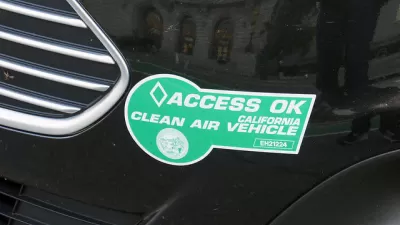The largest recipient of the U.S. DOT 2008 Urban Partnership Agreement are two freeways in LA County where carpool lanes will be converted to Express Lanes with dynamic pricing with additional, clean fuel buses, all funded by the $210 million grant.
"Caltrans and the Los Angeles County Metropolitan Transportation Authority will convert existing carpool lanes to high-occupancy toll lanes on 14 miles of the 10 Freeway and on 11 miles of the 110 Freeway. Transportation officials are considering prices of 25 cents to $1.40 per mile for solo motorists who use the Express Lanes.
A second high-occupancy toll lane will be added in both directions to the 10 Freeway. Plans also call for automated toll plazas, road improvements and additional transit services, including 57 clean-fuel buses that will operate along both highway corridors.
The project is scheduled to be completed by December 2010.
Like other tollways in Southern California, officials plan to use congestion-based pricing -- tolls that rise and fall in direct relation to the volume of traffic -- to keep individual motorists, carpools, van pools and buses in the high-occupancy lanes at a minimum speed of 45 mph, even during rush hour.
The (one-year) demonstration project, which will be evaluated to see if congestion is indeed reduced, has received a $210.6-million federal grant -- the largest of its type awarded to any city to date, according to the U.S. Department of Transportation. Some of the money will also go to improve bus service along the two freeways.
Before the tolls are set by the Los Angeles County Metropolitan Transportation Authority board on July 23, the public will be allowed to comment during five community hearings."
Thanks to MTC-ABAG Library
FULL STORY: L.A. County considers congestion pricing for 110 and 10 freeways

Maui's Vacation Rental Debate Turns Ugly
Verbal attacks, misinformation campaigns and fistfights plague a high-stakes debate to convert thousands of vacation rentals into long-term housing.

Planetizen Federal Action Tracker
A weekly monitor of how Trump’s orders and actions are impacting planners and planning in America.

Chicago’s Ghost Rails
Just beneath the surface of the modern city lie the remnants of its expansive early 20th-century streetcar system.

Bend, Oregon Zoning Reforms Prioritize Small-Scale Housing
The city altered its zoning code to allow multi-family housing and eliminated parking mandates citywide.

Amtrak Cutting Jobs, Funding to High-Speed Rail
The agency plans to cut 10 percent of its workforce and has confirmed it will not fund new high-speed rail projects.

LA Denies Basic Services to Unhoused Residents
The city has repeatedly failed to respond to requests for trash pickup at encampment sites, and eliminated a program that provided mobile showers and toilets.
Urban Design for Planners 1: Software Tools
This six-course series explores essential urban design concepts using open source software and equips planners with the tools they need to participate fully in the urban design process.
Planning for Universal Design
Learn the tools for implementing Universal Design in planning regulations.
planning NEXT
Appalachian Highlands Housing Partners
Mpact (founded as Rail~Volution)
City of Camden Redevelopment Agency
City of Astoria
City of Portland
City of Laramie




























